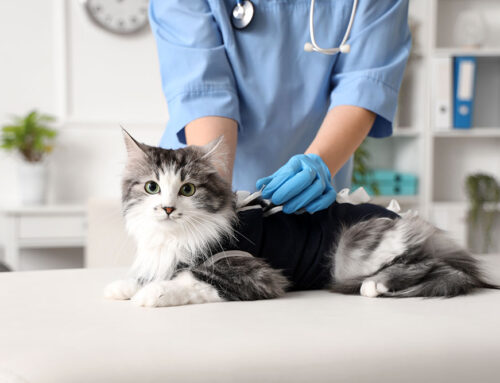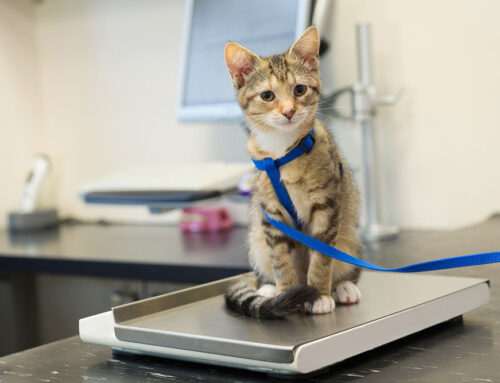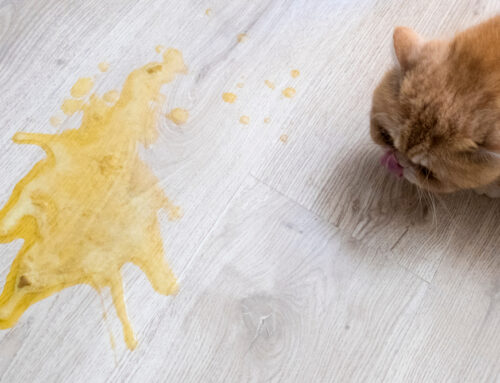As our pets grow older, it’s natural to notice changes in their behavior, mobility, and overall health. Seeing a beloved pet slow down can be bittersweet, but these changes are a normal part of aging. At Arcata Animal Hospital, we’re here to help you understand the aging process in pets, guiding you through the best ways to keep them comfortable, active, and content in their senior years.
Understanding the Aging Process in Pets
Aging in pets brings about physiological changes that can impact their energy, movement, and senses. Over time, natural wear on the body leads to common conditions like arthritis, dental disease, and cognitive decline. Veterinary care becomes increasingly important as pets age, allowing early detection of issues and timely treatment to maintain comfort and quality of life. At Arcata Animal Hospital, our Pet Wellness Plans are designed to support pets at every life stage, adapting preventive care to meet the needs of senior pets.
Recognizing Signs of Aging in Pets
Understanding the signs of aging can help pet owners address new health needs as they emerge. While every pet ages differently, common signs of aging include:
- Reduced Mobility or Stiffness: Joint discomfort and stiffness, often from arthritis, make it harder for older pets to move. Morning stiffness, reluctance to climb stairs, and limping are tell-tale signs. Early management can greatly improve their comfort, making veterinary support crucial.
- Lethargy and Decreased Interest in Play: A noticeable decrease in energy and enthusiasm may indicate underlying health issues, such as joint pain, weight gain, or cardiovascular challenges. Your veterinarian can help identify the cause and recommend treatments to keep your pet comfortable.
- Changes in Appetite or Weight: Aging can lead to changes in metabolism, which affects weight. Dental discomfort can lead to weight loss, while decreased activity can contribute to weight gain. Any significant shifts in weight or appetite should prompt a discussion with your veterinarian.
- Behavioral Changes: Cognitive decline in older pets can manifest as confusion, irritability, or changes in sleeping patterns. Noticing these shifts early allows for supportive care to keep them more comfortable.
Recognizing these symptoms allows you to work with your veterinarian to support your pet’s health as they age. At Arcata Animal Hospital, our Preventative Care programs are designed to detect and manage these issues promptly, helping improve your pet’s quality of life.
Options for Supporting Joint Health and Arthritis Relief
As pets age, managing joint health becomes essential. Arthritis is one of the most common ailments affecting senior pets, causing pain, stiffness, and limited mobility. A holistic approach to arthritis management, including integrative medicine and rehabilitation, can significantly improve your pet’s comfort and quality of life.
Supplements for Joint Health: Supplements like glucosamine, chondroitin, and MSM (methylsulfonylmethane) support joint cartilage health. These supplements are available in various forms, including pills and chews, making it easier to find a suitable choice for each pet’s preferences and needs. Fish oil, rich in omega-3 fatty acids, also reduces inflammation and supports joint health. Together, these supplements can help slow cartilage breakdown and provide anti-inflammatory benefits.
Integrative Therapies for Arthritis Relief: These therapies work by reducing inflammation, improving circulation, and stimulating the body’s natural healing processes.
- Acupuncture:
Acupuncture involves the insertion of tiny, sterile needles into specific points on the body to stimulate nerves, increase circulation, and promote natural pain relief. It is a gentle, drug-free approach to managing arthritis pain and stiffness.
- Laser Therapy:
Low-level laser therapy uses concentrated light to penetrate tissues, reducing inflammation, relieving pain, and accelerating tissue repair. It is an effective, non-invasive method for targeting arthritic joints and improving mobility. Learn more about laser therapy for pets.
- Piezo-Shockwave Therapy:
This modality uses high-energy sound waves to stimulate healing in damaged tissues and reduce pain. Piezo-shockwave therapy is particularly beneficial for pets with chronic joint or tendon issues.
- PEMF (Pulsed Electromagnetic Field Therapy):
PEMF therapy uses electromagnetic waves to improve cellular function and enhance circulation. It provides a non-invasive way to reduce inflammation and support joint health.
- Regenerative Medicine:
Regenerative treatments, such as platelet-rich plasma (PRP) therapy or stem cell therapy, utilize the body’s own healing cells to repair damaged tissues. These advanced options are designed to address severe joint degeneration and promote long-term relief.
- Home Exercise and Massage Programs:
Tailored exercise routines and massage programs help maintain muscle strength, improve joint flexibility, and reduce stiffness. These programs are customized to suit the pet’s specific needs and can be implemented at home with guidance from a veterinarian.
By consulting with your veterinarian about these integrative treatments and rehabilitation options, you can explore effective ways to alleviate your pet’s pain and enhance their comfort.
Don’t Ignore New Symptoms: They Might Be Treatable
It’s easy to dismiss some changes in our pets as “just old age,” but certain symptoms may indicate a treatable condition that can significantly improve your pet’s quality of life. Severe dental disease is a prime example. While dental discomfort is common in aging pets, advanced dental disease can cause chronic pain, infections, and difficulty eating. This can affect overall health, as infections in the mouth can spread bacteria to the bloodstream, impacting other organs.
Addressing dental issues, such as through tooth extraction or treating infections, can give your pet a new lease on life. Pets that previously seemed lethargic or disinterested in food often become livelier and more comfortable once their dental pain is managed. Regular dental exams and cleanings are essential in preventing these issues and keeping your pet’s mouth and body healthy.
So, if you notice changes like decreased appetite, bad breath, reluctance to eat, or signs of pain when chewing, consult your veterinarian. Treating these underlying conditions can improve your pet’s comfort and longevity.
Veterinary Care and Treatment Options for Aging Pets
Routine veterinary care is essential in managing the aging process. As pets age, they may benefit from specialized treatments and care plans tailored to their unique needs:
- Pain Management: Pain management is crucial for aging pets, especially those with arthritis or chronic conditions. A combination of medications like Non-Steroidal Anti-Inflammatories, supplements, and therapies like laser therapy or acupuncture can provide significant relief.
- Physical Therapy and Modified Exercise: Exercise remains beneficial in senior years, but activities may need adjustment. Light, consistent exercise helps maintain strength and flexibility. Regular walks or gentle play can promote joint health and cardiovascular wellness.
- More Frequent Exams: Pets age much faster than humans, with one year in a pet’s life often equating to several years of changes in their health. As they age, conditions like arthritis, kidney disease, diabetes, and heart issues can develop quickly. More frequent exams allow your veterinarian to monitor your pet’s health closely, identify subtle changes, and address potential issues early.
- The Importance of Routine Lab Work for Senior Pets: Routine lab work is a vital part of monitoring your senior pet’s health. Blood and urine tests can detect changes in organ function, such as early kidney or liver disease, before symptoms appear. Regular lab work also ensures that any medications your pet is taking are not causing side effects or affecting other areas of their health. By pairing lab work with regular exams, you can help your pet stay healthy, comfortable, and happy well into their golden years.
By developing a personalized care plan with your veterinarian, you can help your pet remain comfortable and happy in their golden years.
Supporting Your Pet’s Quality of Life at Home: Prevention and Maintenance

A proactive approach to your pet’s health enhances their well-being as they age. Preventive care for senior pets involves supporting their physical, mental, and emotional health:
- Balanced Diet: Senior pets often benefit from a controlled-calorie diet enriched with antioxidants and omega-3 fatty acids to support joints, heart, and immune function. Keeping your pet’s weight appropriate is critical to preventing unnecessary stress to their joints and cardiovascular systems.
- Mental Stimulation: Keeping a pet’s mind active is essential. Puzzle toys, interactive games, and scent-based activities help prevent cognitive decline and keep your pet engaged.
- Mobility Aids for Older Pets: As pets age, mobility challenges can make daily activities difficult. Simple adjustments can greatly improve their comfort and safety:
- Rugs and Stair Treads: Prevent slips on hard floors with added traction.
- Slings or Harnesses: Assist with standing, walking, or climbing stairs.
- Stairs or Ramps: Help pets access furniture or vehicles without straining joints.
- Heating Pads: Ease stiff muscles and joints with gentle warmth
- Move Essentials: Place beds, litterboxes, and food on main floors to reduce the need to use stairs.
- Strollers, backpacks, and wagons: Great to use if your pet needs more breaks on their walks.
For further guidance on supporting mobility and health, refer to resources like the Mobility Matters brochure and the AVMA’s guide on Senior Pets.
Supporting Your Pet’s Golden Years with Compassionate Care
Recognizing and addressing the signs of aging in pets is essential for their well-being. By being attentive to their needs, exploring new treatments, and not overlooking treatable conditions, you can make a profound difference in their comfort and happiness. At Arcata Animal Hospital, we’re here to support you through every stage of your pet’s life with compassionate, expert care.
If you notice changes in your pet’s behavior, energy levels, or comfort, reach out to our team for guidance. We’re here to answer your questions, provide resources, and work with you to ensure your pet enjoys a fulfilling life in their golden years.







Leave A Comment